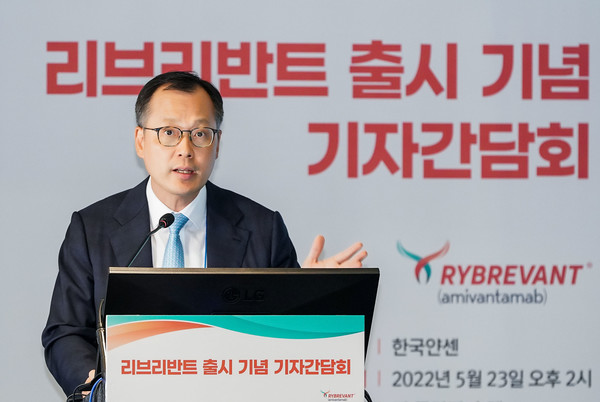Janssen has launched Rybrevant (ingredient: amivantamab), a treatment for non-small cell lung cancer (NSCLC) with epidermal growth factor receptor (EGFR) exon 20 insertion mutation, raising expectations for a new treatment option.
Rybrevant, the first fully human-derived bispecific antibody approved to treat EGFR exon 20 insertion mutation NSCLC, received approval from the Ministry of Food and Drug Safety in February. It was for patients with locally advanced or metastatic NSCLC and with an epidermal growth factor receptor (EGFR) exon 20 insertion mutation that has progressed during or after platinum-based chemotherapy treatment.

Professor Cho Byoung-chul of Yonsei Cancer Center, one of the top experts on lung cancer, predicted a major change in treating patients with EGFR exon 20 insertion mutation NSCLC.
“Rybrevant is a mechanism of action that directly targets EGFR and MET, blocking ligand binding and improving the degradation of EGFR and MET, thereby interfering with signaling functions,” Professor Cho said during a news conference on Monday. “This effectively inhibits tumor growth and induces apoptosis of tumor cells.”
The approval of Rybrevant is significant as there had been no previously approved treatment for EGFR exon 20 insertion mutation NSCLC and existing EGFR tyrosine kinase inhibitors (TKIs) were mostly ineffective, Cho added.
The professor explained that based on clinical study results and real-world data, he expects the drug to show good treatment results in Korean patients with EGFR exon 20 insertion mutation NSCLC.
“EGFR gene mutation is one of the most common mutations in NSCLC, and about 33 percent of patients worldwide show EGFR mutation,” Cho said. “While EGFR gene mutations are observed in about 10-20 percent of Caucasian NSCLC patients, for Asians, including Korea, NSCLC patients with EGFR gene mutations account for 40 to 50 percent.”
According to Cho, the approval of Rybrevant is based on data from the monotherapy arm of the multicenter, open-label, multiple-cohort phase 1 clinical trial CHRYSALIS study.
“The trial evaluated the efficacy of the treatment in 81 patients with locally advanced or metastatic NSCLC who had been diagnosed with an EGFR exon 20 insertion mutation using the existing standard test method and had progressed during or after platinum-based chemotherapy,” Cho said. “As a result of the CHRYSALIS study, the overall response rate (ORR) in the Rybrevant monotherapy group was 40 percent, and 4 percent of the participating patients had a complete response (CR), and 36 percent achieved a partial response (PR).”
The drug also showed a sustained response and manageable safety profile in patients with EGFR exon 20 insertion mutation through clinical studies.
The most commonly reported adverse reactions in clinical studies were rash (84 percent), infusion-related reactions (64 percent), paronychia (50 percent), musculoskeletal pain (47 percent), dyspnea (37 percent), and nausea (36 percent).
With the approval of Rybrevant, Cho stressed that it is now important to conduct research on combination therapy with immune checkpoint inhibitors for solid cancers and the combination with Yuhan’s Leclaza, Korea's 31st novel drug that treats lung cancer.
A Janssen Korea official said the company plans to conduct studies in this area.
“We are considering a target for solid metastatic cancers such as breast cancer, ovarian cancer, malignant mesothelioma, and medullary cell thyroid cancer, and plans clinical research,” said Koh Min-jung, Janssen Korea’s medical lead.

